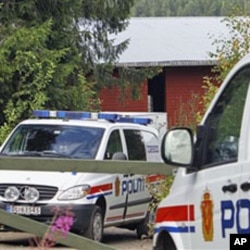A terror attack in Norway last week, which was carried out by an extreme right-wing Norwegian man, has raised questions about security threats in Europe. Is the perceived threat from Islamic extremism has overshadowed security threats from the extreme left and right?
Non-Islamist threats
After last week's attack in Norway, the European Union's criminal intelligence agency Europol said it would set up a team of experts to investigate non-Islamist threats in Scandinavian countries. It said that task force may in the future stretch to a larger range of European nations.
Blanka Kolenikova, a Europe analyst at IHS Global Insight in London, says expanding the focus of security reviews may be useful.
"It can be said that maybe that there is a feel that the threat of Islamic extremism was recently in the center of the attention and maybe other forms of extremism, like this far right extremism, has slipped from the radar of the security agencies," Kolenikova said.
In a report this year Europol said there were no European right-wing terror attacks in 2010. It said extreme left wing groups carried out 45 attacks.
The overall view was that right-wing groups didn't have cohesion or public support. But it did say those on the right were increasingly active on the web.
Kolenikova says right-wing groups are becoming more professional.
"There will always be sympathizers of this ideology and some recent reports also say these far right groups are getting more sophisticated," Kolenikova added. "So yes indeed there is a level of threat that these groups could pose."
Manifesto posted online
Anders Behring Breivik has admitted to carrying out a deadly bomb attack in downtown Oslo and shooting dead dozens more on a nearby island.
Before carrying out the attack on July 22, Breivik appears to have posted a 1500-page 'manifesto' online. Political experts say that the views expressed are consistent with many on the extreme right. One of his main grievances appears to be against Muslim immigration to Europe.
Police in Norway say they believe he acted alone although they are investigating his claim to have links with other cells.
Security threat
Nigel Inkster is Director of Transnational Threats and Political Risk at the International Institute for Strategic Studies in Britain.
He says Islamic terrorism is the most serious threat to European security and is more difficult to trace. However, he notes that right wing extremists are relatively easy to track. For that reason, he says, at least in Britain, it's a job for the police rather than the security forces.
"These groups are not that difficult a security challenge, they are relatively easy to infiltrate and do not require the sophisticated, high end techniques that the security service would typically deploy so I think that's fair enough," Inkster said.
He says in Britain the threat posed by the extreme right normally does not come in the form of a major terror attack.
"I think most of the violence that we have seen from extreme right wing groups has been of a more, if you will, casual, street variety targeted against demonstrations by immigrant groups or simple attacks on immigrants," Inkster added.
Some British mosques say they are boosting their security following the attack in Norway.





